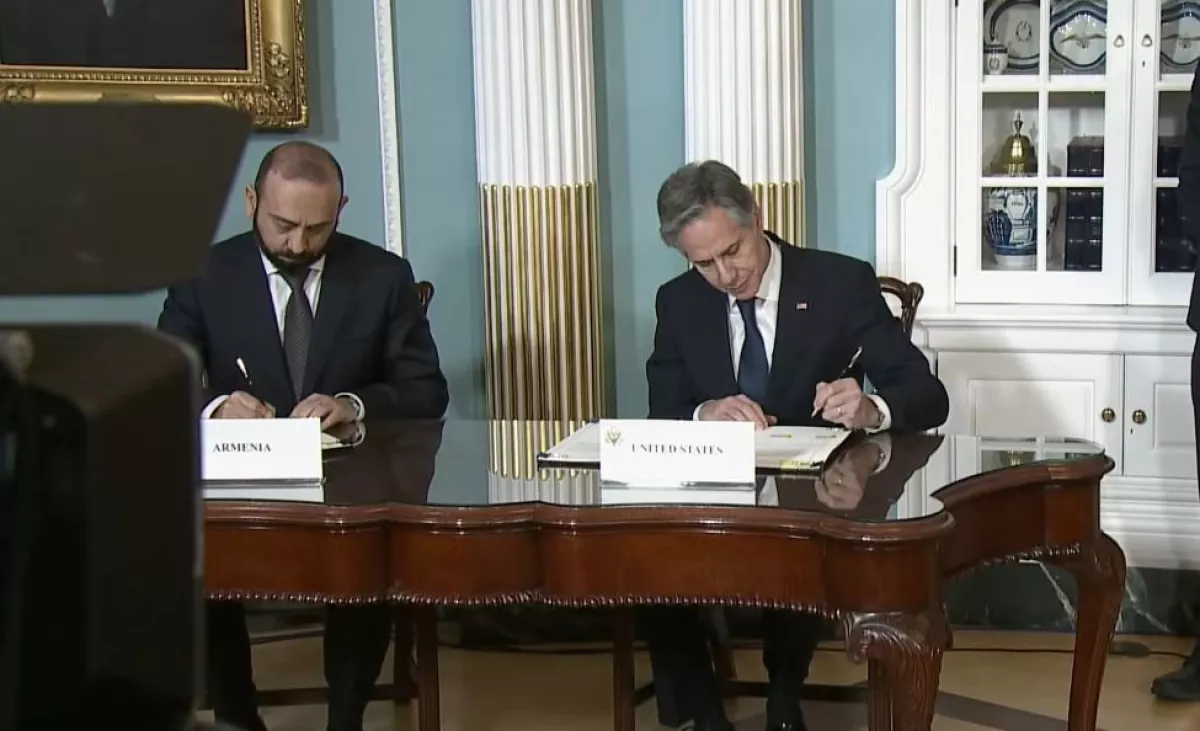Is American democracy supporting fascism? Analyzing the US-Armenian agreement
On January 14, U.S. Secretary of State Antony Blinken and Armenian Foreign Minister Ararat Mirzoyan signed a charter on a strategic partnership between the U.S. and Armenia.

The preamble of this document, as well as the text itself, is full of rhetoric about both sides' commitment to democratic values. "The United States of America and the Republic of Armenia...Emphasize that this cooperation between our two democracies is based on shared values and common interests..." — the preamble of the document states, among other things.
Democrats are particularly fond of cloaking their geopolitical ambitions in grandiose language about supporting democracy, solidarity with democratic societies, and so on. However, this rhetoric often dissipates once we take a closer look at the substance of American actions. Take, for instance, the current situation: as long as Armenia's constitution contains territorial claims against its neighbours, and ultra-nationalism and fascism remain the official ideology in Armenia, it is highly imprudent for the U.S. to emphasize shared values with Armenia.
The first section of the charter contains a point on the Armenia-Azerbaijan settlement: "A dignified and durable peace is essential for a more stable and prosperous future of the South Caucasus. The United States supports the peace process between Armenia and Azerbaijan, including in the border delimitation process based upon the Alma Ata Declaration of 1991."
At first glance, this might seem like a reasonable statement. However, there is a nuance that indicates the U.S. is still pushing for Armenia's perspective on the issue. For now, let’s not focus on Washington's obsession with the Alma Ata Declaration, despite the fact that Yerevan once showed disrespect for it by adopting it with amendments. The key issue here is something else: this is not the first time the Americans have used the phrase "dignified peace." It's an undiplomatic, unscientific, and frankly absurd term. What does "dignified" mean in political, political science, international law, or justice terms? Why don't the Democrats use the word "dignified"? The answer is simple: because fairness, in the context of the entire history of the Armenia-Azerbaijan conflict, implies not only constitutional reform in Armenia, not just its delimitation, but also reparations and compensations paid by Armenia to Azerbaijan, as well as the return of Azerbaijanis expelled from Armenia. By replacing "fair" with "dignified," the Biden administration is committing a forgery, as "dignified" in this case means "not embarrassing the losing side" and "not punishing the aggressor."

The first section of the document continues with a statement on transport communications: "The United States supports the unblocking of regional transport communications in the South Caucasus, based on full respect for the countries’ sovereignty and jurisdiction. Recognizing that the flow of goods and people across borders leads to interdependencies and mutual benefits for neighbors, the United States also intends to continue to advocate for the normalization of relations between Armenia and its neighbors."
However, in the second section, which deals with the economy, we see a clearer view of the Biden administration's stance: "Recognizing the multifaceted challenges faced by Armenia due to its landlocked position and limited access to global trade markets, the United States and Armenia intend to deepen cooperation aimed at the integration of Armenia into wider regional transport networks and connectivity initiatives, in particular through strong political support and promotion of Armenia’s ‘Crossroads of Peace’ project."
In other words, Washington is helping Yerevan bypass its obligations under the Trilateral Statement, specifically regarding the provision of the Zangezur Corridor.
In the same second section, the intention of both countries "to explore opportunities to increase and diversify Armenia’s energy production and supplies" stands out. The document states that this includes the development of a civil nuclear energy program with the highest standards of nuclear safety, protection, and non-proliferation. This is a significant blow to Russia, as it is Rosatom that oversees Armenia's nuclear issues, including the key nuclear facility, the Metsamor Nuclear Power Plant.
Perhaps the most interesting part of the document is the third section, titled "Defense and Security." It states that "the United States and Armenia intend to expand the scope of their defense and security cooperation programs, including through establishing bilateral defense consultations within the next year and assisting the Armenian military through professional military assistance training."
Then, under the pretext of combating the threat of weapons of mass destruction proliferation, "the United States intends to support the capacity building of the Armenian Border Guard Service and State Revenue Committee." But this is not all. One of the provisions also states that "The United States intends to continue to foster rights-respecting institutions, including by supporting Armenia’s efforts to reform and modernize its Ministry of Internal Affairs and law enforcement agencies. Such support is expected to include police education and other measures to provide for public safety, to investigate and hold accountable those responsible for abuses, and to combat transnational crime and corruption."

As we can see, the aforementioned provisions of the charter signify a new qualitative phase in the integration of U.S. law enforcement into the functioning of the Armenian state.
The fourth section contains lengthy articles on U.S. assistance to Armenia in strengthening democracy. Amid this idealistic language, there is a point stating: "Recognizing that Armenia has dealt with a displacement crisis since September 2023, the United States plans to continue to support Armenia as it provides assistance to displaced persons and refugees from Nagorno-Karabakh."
Here, we find a subtle hint of disrespect for Azerbaijan's territorial integrity on the part of the U.S. In a single brief point, Washington refers to the resettlement of Armenians from the Nagorno-Karabakh region of Azerbaijan to Armenia as "displacement," and those who voluntarily left Azerbaijan as "displaced persons and refugees." In international practice, "displaced persons" typically refers to people who move within the same country. Does this not imply that the U.S. considers Nagorno-Karabakh to be part of Armenia?
To summarize, the key points emerging from this document are as follows: the U.S. commits to developing Armenia's nuclear energy sector, training its military and police, essentially controlling internal security agencies, and exercising an as-yet unclear form of control over Armenian border guards. If these provisions are implemented, they would transform Armenia into a battleground for conflict between the U.S. and Russia.
Regarding the Armenia-Azerbaijan settlement, the Biden administration seems to have, in desperation, slammed the door on Baku by indicating the U.S.'s intention to promote a "dignified" peace for Armenia, undermining Yerevan's obligation to provide the Zangezur Corridor and leaving room to push the issue of Armenians in Karabakh. In essence, this is a continuation of what the Democratic administration has already unsuccessfully attempted to do.
Would Trump want to adhere to these, as well as all other provisions? Unlikely, given the animosity he holds toward Biden and the document's destructive nature in relation to Trump's isolationist agenda. However, the most practical and strategically sound decision on his part would be to ignore the sections that damage U.S. relations with Azerbaijan and Türkiye, while fully utilizing the provisions that bring Yerevan under Washington’s control. In such a scenario, Armenia, facing this obvious reality, would gain nothing but further erosion of its sovereignty.








